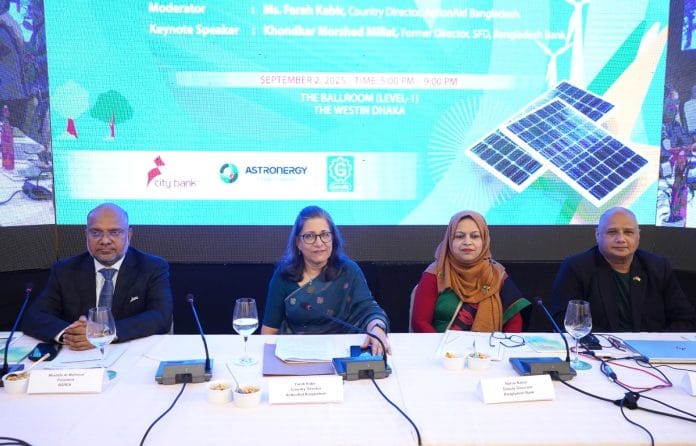Despite Bangladesh’s vast potential for rooftop solar power, implementation of the program has largely stalled due to financing challenges, sector stakeholders said at a discussion in Dhaka on Tuesday.
Speaking at the event titled “Unveiling Solar Rooftop Finance: Towards a Sustainable Energy Future” at the Westin Hotel, experts stressed that without new financing mechanisms, the government’s renewable energy target of 30 percent by 2040 will remain out of reach.
The event was jointly organized by the Bangladesh Sustainable and Renewable Energy Association (BSREA) and ActionAid Bangladesh. It was presided over by BSREA President Mostafa Al Mahmud, with Bangladesh Bank Deputy Governor Nurun Nahar as chief guest. ActionAid Bangladesh Country Director Farah Kabir moderated the session, while the keynote was presented by Khondkar Morshed Millat, former Director of Bangladesh Bank’s Sustainable Finance Department.
Participants included representatives from the Power Division, SREDA, IDCOL, commercial banks, non-bank financial institutions (NBFIs), development partners, distribution companies, civil society, and renewable energy leaders.
Financing: the main roadblock
BSREA President Mostafa Al Mahmud said that while Bangladesh’s renewable energy policy aims to generate 20 percent of electricity from renewables by 2030 and 30 percent by 2040—including 3,000 MW of rooftop solar by December 2025—progress is slow. Currently, only 5.6 percent of the country’s electricity comes from renewable sources.
“Technology is not the problem, nor is there a lack of will. The biggest obstacle is financing,” he said. “Many commercial banks remain reluctant to lend for rooftop solar, considering it risky. Approval under net metering takes too long, while access to long-term, affordable loans is still limited.”
He noted that rooftop solar offers the fastest, most sustainable solution to Bangladesh’s growing energy demand, with immense untapped potential across government buildings, hospitals, schools, factories, and commercial rooftops.
Policy and financial solutions needed
Speakers suggested that Bangladesh Bank could expand refinancing schemes, introduce credit guarantees, and encourage blended finance to de-risk investments. Commercial banks and NBFIs, they said, should design new financial products such as leasing, project financing, “pay-as-you-save” models, and green bonds.
IDCOL’s successful experience in off-grid solar and large-scale projects should now be leveraged for rooftop solar expansion, particularly in industrial and residential sectors, they added.
“If implemented properly, rooftop solar can ease dependence on gas and fuel imports, enhance energy security, reduce carbon emissions, and generate thousands of green jobs,” said the BSREA president.
Way forward
Panelists stressed that a collective approach is essential. The Power Division and SREDA must ensure stable, transparent, and investor-friendly policies; utility companies should simplify net metering and grid connections; and industry players must ensure quality project implementation.
They also called for development partners to provide blended finance, risk guarantees, and replicate successful global models. A green finance roadmap—featuring instruments like green bonds and results-based financing—along with a Green Finance Taskforce was proposed to steer Bangladesh’s rooftop solar journey.

